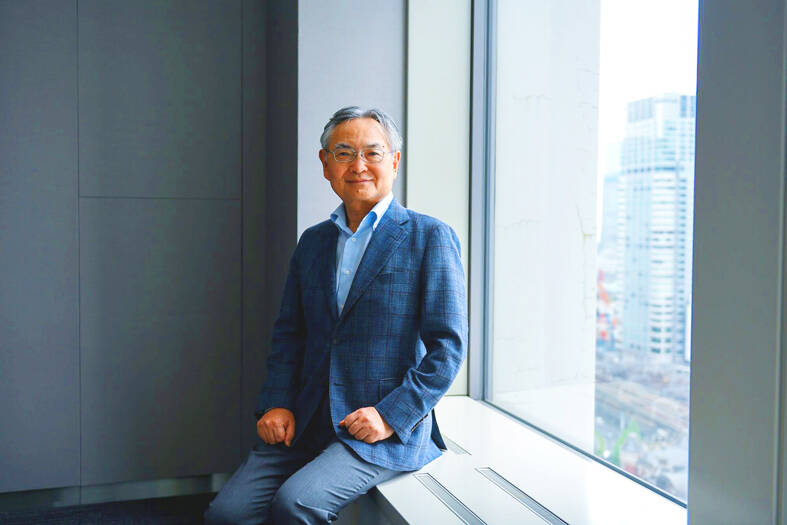Nikon Corp is fielding strong demand for its legacy chipmaking machines in China, which is mobilizing resources to build its own semiconductor supply chain.
Inquiries for the Japanese precision maker’s lithography tools have surged in China, Nikon president Muneaki Tokunari said.
The company is set to revamp a lithography machine geared for decades-old manufacturing processes. Its NSR-2205iL1, launching this summer, would serve the market for mature chip technology and Nikon expects to sell more than 10 units of the machine annually, said Tokunari, who is also chief operating officer and chief financial officer.

Photo: Bloomberg
New companies are sprouting up in China to make simpler semiconductors such as those that regulate power in vehicles, electronic devices and appliances. Behind that push are restrictions by the US and its allies, including Japan, on sales of cutting-edge equipment used to make advanced chips that enable artificial intelligence. Fewer restrictions are in place for well-established know-how.
“Our older machines are being used in China to make so-called legacy chips, and we are getting remarkable levels of inquiries for our new model,” Tokunari said in an interview, adding that the company’s tools are also available on the second-hand market.
Spurred by a countrywide effort to shore up its chip industry, China’s manufacturing capabilities are evolving at such a pace that “I wouldn’t be surprised if they are able to do quite a bit in five to 10 years,” he said.
Nikon used to rely heavily on Intel Corp for revenue, with the US firm accounting for 80 percent of semiconductor-related sales until a few years ago, he said, adding that now other companies comprise a majority of such sales, and the company is diversifying its client base in China, Taiwan and Japan.
However, headwinds exist. The US President Joe Biden’s administration has told Japan and the Netherlands that it is considering invoking the US’ foreign direct product rule if the two allies do not tighten export controls on chipmaking equipment further.
Restrictions on technology would likely become more strict, Tokunari said.
Nikon asks for export rules that are fair to all players in the market, he said.
Nikon is now making a strong marketing push in China with its new argon-fluoride lithography machines, released earlier this year in compliance with export controls, he said.
The Netherlands has restricted sales of industry leader ASML Holding NV’s extreme ultraviolet lithography machines used to make cutting-edge chips.
In the two years to March 2026, Nikon targets a 66 percent rise in operating profit to ¥25 billion (US$160 million) at its precision equipment segment, which includes lithography tools.
The company seeks to invest some of these profits to expand its customer base in areas such as digital manufacturing.
Nikon is fielding interest from defense and aerospace companies in the US for its metal 3D printers, Tokunari said.

The US dollar was trading at NT$29.7 at 10am today on the Taipei Foreign Exchange, as the New Taiwan dollar gained NT$1.364 from the previous close last week. The NT dollar continued to rise today, after surging 3.07 percent on Friday. After opening at NT$30.91, the NT dollar gained more than NT$1 in just 15 minutes, briefly passing the NT$30 mark. Before the US Department of the Treasury's semi-annual currency report came out, expectations that the NT dollar would keep rising were already building. The NT dollar on Friday closed at NT$31.064, up by NT$0.953 — a 3.07 percent single-day gain. Today,

‘SHORT TERM’: The local currency would likely remain strong in the near term, driven by anticipated US trade pressure, capital inflows and expectations of a US Fed rate cut The US dollar is expected to fall below NT$30 in the near term, as traders anticipate increased pressure from Washington for Taiwan to allow the New Taiwan dollar to appreciate, Cathay United Bank (國泰世華銀行) chief economist Lin Chi-chao (林啟超) said. Following a sharp drop in the greenback against the NT dollar on Friday, Lin told the Central News Agency that the local currency is likely to remain strong in the short term, driven in part by market psychology surrounding anticipated US policy pressure. On Friday, the US dollar fell NT$0.953, or 3.07 percent, closing at NT$31.064 — its lowest level since Jan.

The New Taiwan dollar and Taiwanese stocks surged on signs that trade tensions between the world’s top two economies might start easing and as US tech earnings boosted the outlook of the nation’s semiconductor exports. The NT dollar strengthened as much as 3.8 percent versus the US dollar to 30.815, the biggest intraday gain since January 2011, closing at NT$31.064. The benchmark TAIEX jumped 2.73 percent to outperform the region’s equity gauges. Outlook for global trade improved after China said it is assessing possible trade talks with the US, providing a boost for the nation’s currency and shares. As the NT dollar

The Financial Supervisory Commission (FSC) yesterday met with some of the nation’s largest insurance companies as a skyrocketing New Taiwan dollar piles pressure on their hundreds of billions of dollars in US bond investments. The commission has asked some life insurance firms, among the biggest Asian holders of US debt, to discuss how the rapidly strengthening NT dollar has impacted their operations, people familiar with the matter said. The meeting took place as the NT dollar jumped as much as 5 percent yesterday, its biggest intraday gain in more than three decades. The local currency surged as exporters rushed to